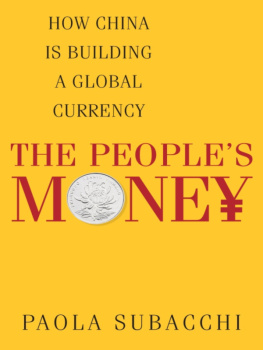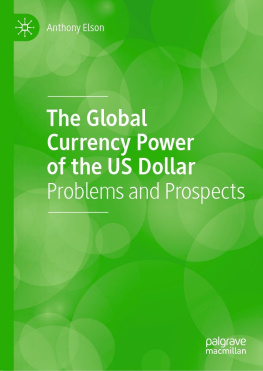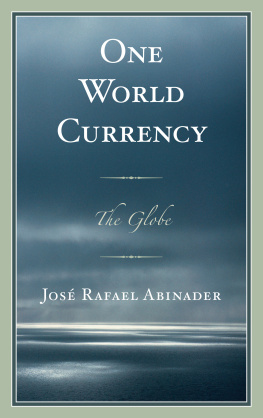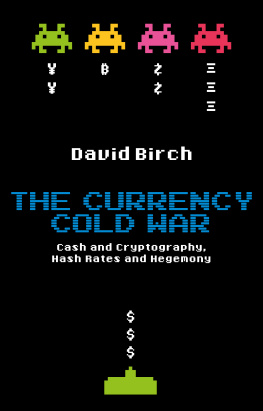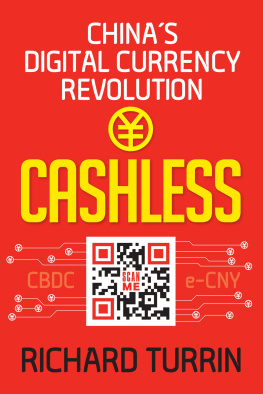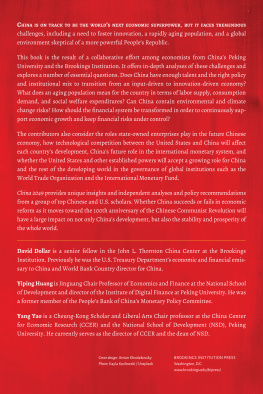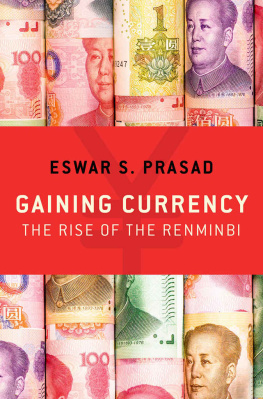Table of Contents
THE PEOPLES MONEY
PAOLA SUBACCHI
THE PEOPLES MONEY
How China Is Building a Global Currency
Columbia University Press / New York
Columbia University Press
Publishers Since 1893
New York Chichester, West Sussex
cup.columbia.edu
Copyright 2017 Columbia University Press
All rights reserved
E-ISBN 978-0-231-54326-2
Library of Congress Cataloging-in-Publication Data
Names: Subacchi, Paola, 1962- author.
Title: The peoples money : how China is building a global currency / Paola Subacchi.
Description: New York : Columbia University Press, [2017] | Includes bibliographical references and index.
Identifiers: LCCN 2016009131 | ISBN 9780231173469 (cloth : alk. paper)
Subjects: LCSH: Foreign exchangeChina. | Renminbi. | FinanceChina. | Monetary policyChina. | ChinaCommerce.
Classification: LCC HG3978 .S83 2016 | DDC 332.4/50951dc23
LC record available at https://lccn.loc.gov/2016009131
A Columbia University Press E-book.
CUP would be pleased to hear about your reading experience with this e-book at .
Cover design: Mary Ann Smith
Cover image: Getty Images
CONTENTS
China, the largest nation in the world, remains both an enigma and a potential factor in world stability.
CHINA: A REASSESSMENT OF THE ECONOMY
W HAT CAN A non-Chinese person add to the debate on Chinas development? As I was writing this book, I asked myself this very question several times. A Chinese friend of minea fine observer of both worldsoffered a reassuring answer. Quoting an old Chinese saying (The foreign monk is better at reciting the sutras) he claimed that, like a foreign monk, I had the advantage of being more detached than the insiders from the day-to-day discussions and so, perhaps, stood a better chance of grasping the full picture of Chinas vision for the renminbi (which means, literally, the peoples money). And in the spirit of a foreign monk, who brings together the insiders knowledge and connects all the dots, I started to research and then write The Peoples Money.
Why the renminbi? Because money and finance are the missing bits of Chinas extraordinary transformation that began almost forty years ago when Deng Xiaoping launched the first economic reforms. Chinas rise has surprised and fascinated many people around the world. Today its economy is one of the worlds largest, competing with the most advanced countries. But it retains many features of a developing economy, from the low income per capita to the limited international use of its currency. To become an economic and financial heavyweight China needs to have a currency that can be used in international trade and finance and that non-Chinese savers and investors want to hold in their portfolio.
What China is doing to transform the renminbi into an international currency and to reform its banking and financial sector is not a linear process. There is so much trial and error, and so many interconnected components, that the whole picture of Chinas strategy inevitably looks blurred. But there is a picture thereone that the rest of the world must discern to understand Chinas future. In The Peoples Money I try to assemble this picture by decoding official documents, analysing numbers, bringing in anecdotal evidence and factoring in formal and informal conversationsincluding the nods and winks from officials who cannot acknowledge explicitly what the grand plan is.
This book presents my current understanding of Chinas renminbi strategy that, if it is successful, should usher in the age of Chinese capital and contribute to building a moderately prosperous society by 2020 as spelled out in the countrys Thirteenth Five-Year Plan. I have tried to bring together all the policies that have been implemented since 2010 to assess the long-term plans while also offering an overview of Chinas recent economic history, because to understand current developments it is critical to look at where China comes from. Past developments and current events provide the framework to pin down what is in effect a moving target.
The future of China, and of the renminbi, is of course important for China experts, but this book is not just for them. The Peoples Money tells a story in plain, nonspecialist language and aims to draw in readers interested in economic and financial affairs who feel put off by the excessive specialism in the field. Colleagues who read earlier drafts were surprised not to find any tables or charts. This was a deliberate choice to make the narrative central to the books structure.
Inevitably The Peoples Money is also a book on the dollar, as it is impossible to talk about the renminbi, and China, without referring to the dollar, and the United States. Deliberately, I tried to steer away from the discussion on whether the rise of the renminbi will turn into a demotion of the dollar. Many books have been written on the future of the dollar, and most of these books have been written by American scholars for the domestic audience. Here I offer different perspective on how the future trajectory of the dollar will be affected by the international development of the renminbi if China succeeds in its long-term financial and monetary reforms.
Throughout the book, if not otherwise indicated, the dollar is the U.S. dollar. I also refer to the Chinese currency as renminbi. This is the official name that was introduced when the Peoples Republic of China was established in 1949. It is also possible to use yuan, which is the name of a unit of the renminbi currencylike pound sterling, both the official name of the British currency and pound that is a denomination of the pound sterling. Originally, the name yuan indicated the thaler (or dollar), the silver coin minted in the Spanish empire. Japans yen and South Koreas won are derived from the same Chinese character. Interestingly, in Chinese the U.S. dollar is mei yuan, or the American yuan.
ACKNOWLEDGMENTS
Writing a book often feels like an act of self-inflicted misery. The support, enthusiasm, and friendship of many people helped me contain my misery within tolerable and manageable levels. Even so, I know I was unbearable! Thank you, Stephen and Philip, and Francesco, Martina, and Sabrina (and extensions) for putting up with me.
A bunch of extraordinary women were critical to keep this project on track. Sarah Okoye kept me organized when I was busy with the book. Leslie Gardner believed in the project from when it was just an idea, arranged the perfect match and kept smiling even when everything looked pear-shaped. Bridget Flannery-McCoy was the editor from heaven: intelligent, good-humored and engaged. She helped me turn a boring technical draft into a book that a non-specialist audience may be interested to read.
Julia Leung, former Under Secretary for Financial Services and the Treasury of the Hong Kong SAR Government and then Inaugural Julius Fellow at Chatham House, helped me to see the big picture and to understand the long-term impact of Chinas renminbi strategy. She was generous with her time in discussing, on a number of occasions, the principal ideas in this book, providing some goalposts at the beginning of the project and sharing her deep knowledge and understanding of Chinas financial sector.
Yu Yongding was always happy and willing to share with me his thinking and to provide some warnings when my own thinking was too Hong Kong like. Gao Haihong, Li Jing, and Li Yuanfang not only shared with me many lunches and dinners in Beijing, but also their vast knowledge of Chinas economy; they supported this project in all possible ways, especially with their friendship. The whole CASS-IWEP teamin particular Liu Dongmin and Xu Qiyuanprovided the physical and intellectual space for numerous workshops to discuss the internationalization of the renminbi.

